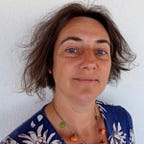Connections and ripples
I accidently signed up for one of those Massive Open Online Courses, or MOOCs. It came through on a network — this looks good, the person wrote. It did, so I signed up after a very short skim over. I thought it might just be a one-day something interesting, turned out to be a commitment for the next few weeks, a fair amount of homework and an opportunity to learn with and meet some fascinating people. I’m a bit behind with the homework, didn’t realise I had to actually be there from the offing, so I’m putting in the late nights like the good old days of studying.
The course — Designing Resilient Regenerative Systems; Worldviews — Moving from Sustainability to Regeneration — has attracted people from over 78 countries and all different backgrounds, although with an academic slant. We are forming cohorts, or communities of interest, for example through countries or language.
Yesterday, ours met virtually for the first time. This is when I really believe that the tools we have, with the internet and virtual meeting and learning spaces, really show how incredibly gifted we all are. With ten others, our Portuguese cohort, some scattered in different countries, talked a little about our lives, experiences and reasons for joining. A couple of nights ago, a larger meeting was hosted by three lecturers giving their insights. It is fascinating.
As someone who bridges between academia, practice and communities, it takes a while to get the brain back into the swing of things, really thinking and interrogating, like only university asks you to. Whirr, click, I can hear the cogs turning in my head and new ideas, evaluations and reflections coming forward. Here are some of these so far.
We know that we need to change The System. It is an impossible and also essential task that we set ourselves. The System is different things, to different people around our connected globe. We are part of The System in different ways. We have diverse cultural and historic backgrounds upon which The System is viewed through our eyes, some guilded and others full of blood. We are largely products of our nuture, bound by climate, culture, language, heritage, context and community. Much, much more obviously could be listed there.
The enormity of this task creates strong emotional responses. Some people are brave enough to risk arrest and take to the streets with love in their fierce hearts. Others will feel guilt, powerlessness, fears — of loss, change and control. As we are exploring in this course, humanity is undergoing traumas — of war, poverty and inequality, moral and ethical, biodiversity and climate crisis. We assult ourselves with bad news, in turn this is detrimental to both our individual selves, and also our collective psyches.
The regeneration narrative therefore, seeks to move into the space beyond sustainability. We shouldn’t just ask for an existence which is sustainable; we might as well be plugged in like the Matrix. A regenerative future has the potential to be everything now, and so much more. It also has the space to bring in each of us, into a collective and connected time. Here, with open hearts and minds, how we regenerate can be asked more widely.
I know this sounds a bit hippy to some. As someone who doesn’t see myself as particularly spiritual, this kind of thinking can be tricky. By moving outside of my comfort zone though, I am forcing new experiences to happen. This can only be good. Think of times when you thought you weren’t going to like someone, but they ended up being a really good friend. Allowing ourselves to listen to others, without judgment, can be really hard. In a world of likes and superficial profiles, connecting with people has to be a rediscovered skill. This is especially true after the pandemic, yet it is also a perfect time for reinvention. And boy, are we good inventors!
We are humanity. Our problems are ours to solve now. We have the solutions available to achieve this. Regeneration will go beyond landscape and urban spaces, beyond talking about our living world and into our very hearts. Each one of us has the chance to really think about what we need to have happen, to create that space for regeneration. This can happen first with our self, and then through fostering connections and building capacity. We are social creatures and the opportunities to transform our future are everywhere.
This is the new story. It is already being written, millions of people across the planet taking action where they can to improve their world. Some of those people are working a high-levels, in national Governments or the United Nations. Many people are doing work that they won’t even see as regenerative; connecting communities, building shared assets and gardens, responding to the needs of others. Loads of people like me, doing what they can in their line of work, connecting and learning, sharing and empowering, mobilising. Lots more folks are feeling increasingly disenfranchised, disillusioned and lost. Many, many more are ready to move our story forward, into one of hope.
The dictionary definition of REGENERATION: regeneration noun [U] (IMPROVEMENT): the act of improving a place or system, especially by making it more active or successful.
regeneration noun [U] (GROWTH) — biology, medical specialized: the act of something growing or being grown again.
I’m going to just let this sit here, whilst I think around the subject. I’m on part two now, around the origins of sustainabililty and what this might look like in my future. From sustainability to regeneration — what does that mean for you?
